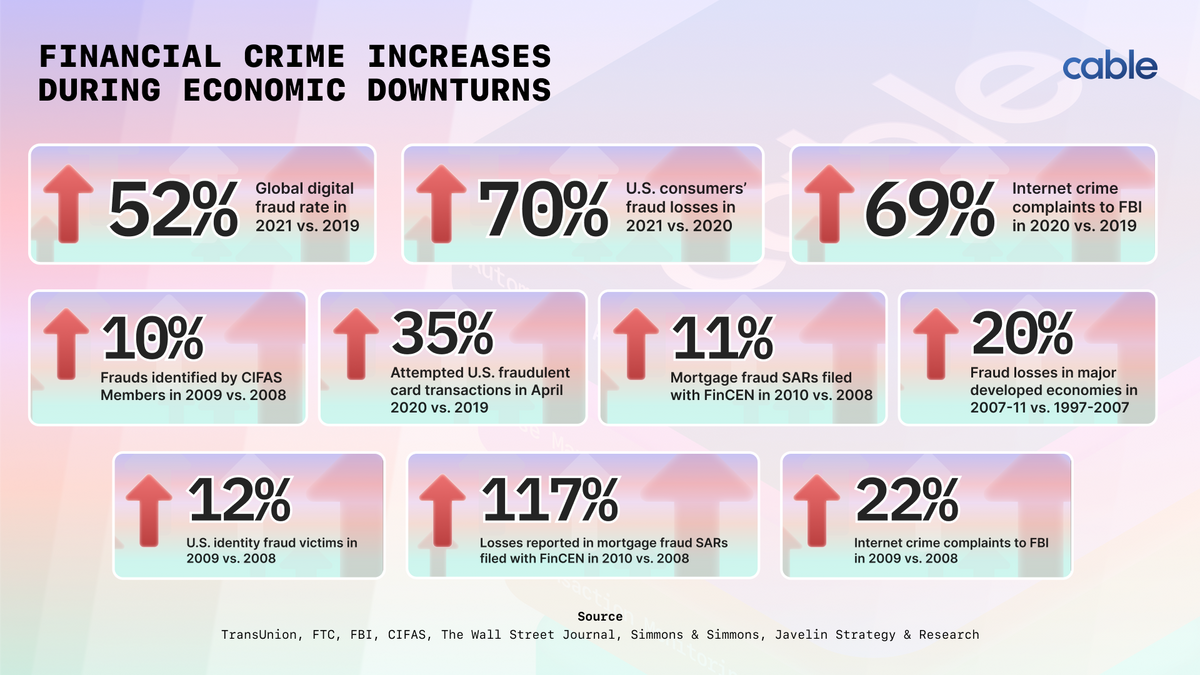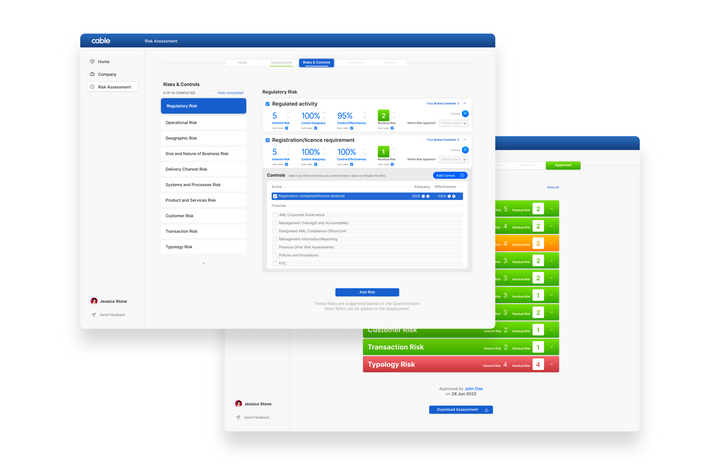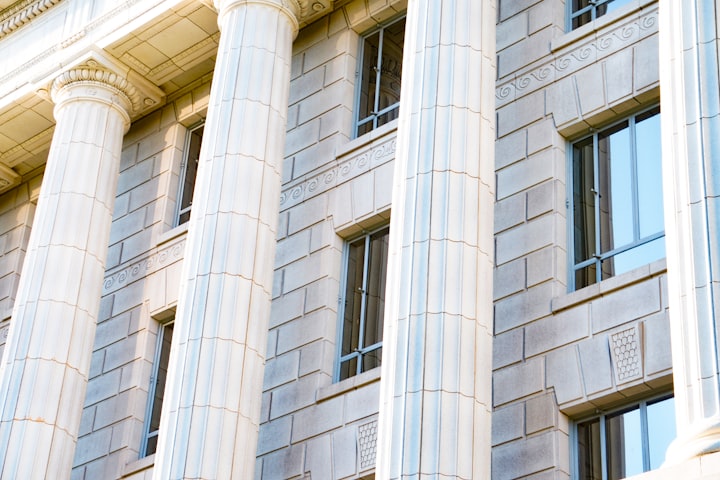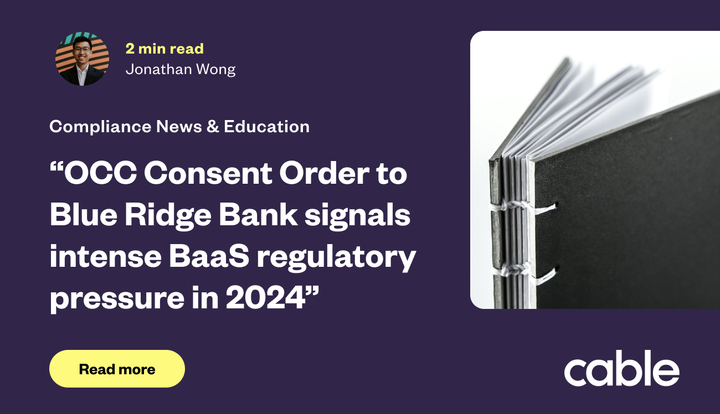Financial Crime Increases During Economic Downturns

Financial crime increases during and after a major economic downturn. Past financial crises show this to be true. Law enforcement authorities, regulators, international organizations, and industry experts all agree on this fact.
Yet, amidst pressing business challenges, financial crime compliance can fall out of focus.
Given our current bleak economic outlook, what does this mean for firms and compliance officers? While firms keenly feel pressures to tighten belts and cut costs, they absolutely cannot ignore the increased threat of financial crime.
In a downturn, compliance officers must keep financial crime risks front and center for stakeholders and ensure anti-financial crime systems and controls stay effective.
Increasing financial crime rates
Historical data gives us plenty of examples of financial crime surges in previous downturns. During both the 2008-09 financial crisis and the economic recession during the COVID-19 pandemic, the infographic above shows that fraud and other crimes shot up.
This means that you should expect a drawn-out economic downturn to be accompanied by a host of different elevated financial crime risks. Fraud is naturally a primary concern for businesses as it hits the bottom-line. But increased criminal activity means all sorts of illicit finance will tick up in a downturn (including channels to launder ill-gotten gains), so firms should anticipate a greater risk of coming into contact with a wide range of financial crime.
Different crime typologies become more prevalent depending on the circumstances of an economic crisis. For example, mortgage-related scams and fraud increased in the 2008-09 financial crisis, whereas the COVID-19 pandemic saw medical-related fraud schemes proliferate.
But what remains the same is this: criminals are highly adaptive and opportunistic, and they will quickly exploit any weaknesses or vulnerabilities resulting from a downturn.
Criminals are highly adaptive and opportunistic, and they will quickly exploit any weaknesses or vulnerabilities resulting from a downturn.
Compliance officers have to expect that new illicit finance techniques and channels will emerge during an economic downturn. Make sure your firm is ready to face these challenges.
Increasing vulnerabilities and opportunities
Why does financial crime swell in a downturn? Simply put, the incentives, opportunities, and reasons for financial crime are higher. Your firm has to be alert to these changing circumstances.
Increased unemployment and costs of living – and general economic fear and uncertainty – lead people to take risks and fall more easily for scams, like romance or imposter scams. People in dire straits can be more prone to committing fraud or other bad acts. Criminals sometimes become the last resort for people in distress, leading to increased criminal activity like illegal money lending. Or, criminals may exploit relief measures, like government stimulus or support packages, or charitable giving.
Businesses in financial stress also may take more risks in a downturn. This might mean deviating from business-as-usual to engage in riskier deals or turning a blind eye to signs of illicit activity. Businesses may also treat compliance as an afterthought when resources become limited.
In essence, an economic downturn means there will be a massive spike in the vulnerabilities and opportunities that make financial crime more likely.
You cannot assume your compliance systems and controls are entirely effective or properly tuned given the change to the status quo.
Increasing oversight expectations
Anticipate increased oversight in a downturn along with increased financial crime risks. In past economic crises, regulators have issued multiple regulatory advisories to industry members on emerging financial crime typologies.
In the 2008-09 financial crisis, there were FinCEN advisories on loan modification scams, mortgage fraud schemes, and suspicious activity related to government-relief programs. During the COVID-19 pandemic, numerous national and international law enforcement bodies, as well as regulators, issued advisories on all types of financial crime typologies emerging in the pandemic, from medical scams to cybercrime to insurance fraud.
You should take notice of these advisories and respond appropriately. This means that at the same time you’re balancing the economic challenges of a downturn, you’ll also be subject to increased oversight expectations to detect and prevent financial crime.
Compliance officers must make sure stakeholders understand that an economic downturn is no excuse for becoming lax on compliance. Staying in line with regulatory expectations only becomes even more critical.
Practical steps
So what can you do to stay ahead of the curve under current economic conditions? Here are a few practical tips:
- Be prepared for increased stakeholder scrutiny. Start preparing now! How will you explain to board members, regulators, auditors, and other stakeholders what you are doing to maintain an effective financial crime compliance program in the downturn?
- Review your risk assessment and risk appetites. Do you need to make any tweaks to your risk assessment or risk appetites? The shifting risk landscape means your risk assessment can’t remain static.
- Educate customers. Have you communicated to your customers about the risks of fraud and other financial crime? Educating your customers is a key part of a strategy to mitigate your risks.
- Ensure coordination between your internal financial crime units. Avoid potential suspicious activity falling through gaps between your fraud, AML, sanctions and other functions. Ensure information is shared between units.
- Monitor suspicious activity. Encourage your First Line to be extra vigilant for unusual or suspicious activity that is out of the ordinary for your customers, given the increased likelihood for illicit activity to occur.
Sources:
- https://solutions.transunion.com/global-digital-fraud-trends/
- https://www.ftc.gov/news-events/news/press-releases/2022/02/new-data-shows-ftc-received-28-million-fraud-reports-consumers-2021-0
- https://www.ic3.gov/Media/PDF/AnnualReport/2016_IC3Report.pdf
- https://www.ipai.pt/fotos/gca/fraudscape_february_2010_1271013001.pdf
- https://www.wsj.com/articles/borrower-beware-credit-card-fraud-attempts-rise-during-the-coronavirus-crisis-11590571800
- https://www.fbi.gov/stats-services/publications/mortgage-fraud-2010
- https://www.simmons-simmons.com/en/publications/ck8k5nooe0xul0a269v7zjn0s/fraud-in-the-time-of-covid-19
- https://www.prnewswire.com/news-releases/javelin-study-finds-identity-fraud-reached-new-high-in-2009-but-consumers-are-fighting-back-83987287.html
- https://www.fbi.gov/stats-services/publications/mortgage-fraud-2010
- https://www.ic3.gov/Media/PDF/AnnualReport/2013_IC3Report.pdf



